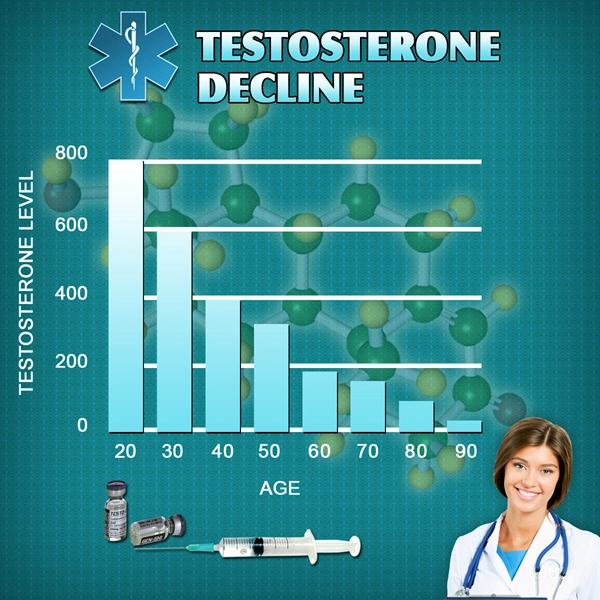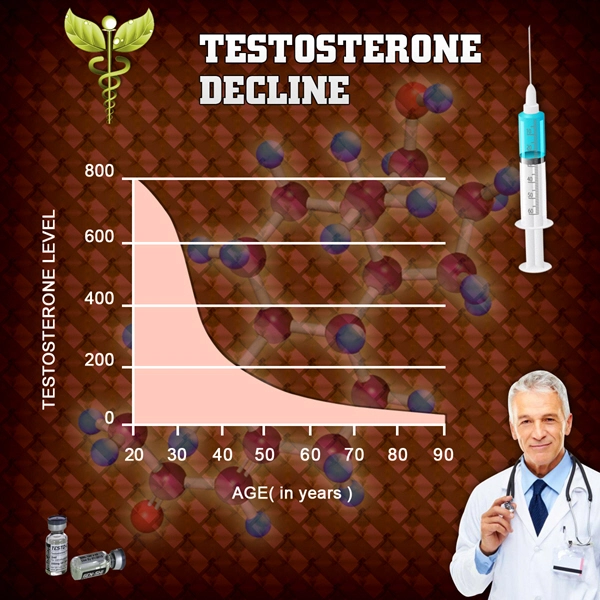Introduction
Testosterone deficiency syndrome (TDS), also known as hypogonadism, is a condition that affects a significant number of American males. Characterized by low levels of testosterone, TDS can lead to a variety of symptoms, including reduced libido, fatigue, and decreased muscle mass. Recent research has also highlighted a concerning link between TDS and anemia, a condition marked by a deficiency of red blood cells or hemoglobin. This article explores the relationship between testosterone deficiency and anemia, focusing on its implications for American males.
The Prevalence of Testosterone Deficiency Syndrome
In the United States, TDS is increasingly recognized as a common health issue among men. Studies suggest that approximately 2-6% of adult men suffer from clinically low testosterone levels, with the prevalence rising with age. The condition can result from various factors, including genetic predispositions, chronic diseases, and lifestyle choices. Understanding the widespread nature of TDS is crucial for addressing its associated health risks, including anemia.
Understanding Anemia and Its Symptoms
Anemia is a medical condition characterized by a reduced number of red blood cells or a decrease in the amount of hemoglobin in the blood. This can lead to symptoms such as fatigue, weakness, shortness of breath, and pale skin. In severe cases, anemia can significantly impact quality of life and overall health. While anemia can be caused by numerous factors, including nutritional deficiencies and chronic diseases, its association with testosterone deficiency has garnered attention in recent years.
The Link Between Testosterone Deficiency and Anemia
Research has established a significant correlation between low testosterone levels and anemia. Testosterone plays a vital role in erythropoiesis, the process of red blood cell production. When testosterone levels are low, erythropoiesis can be impaired, leading to a decrease in red blood cell count and, consequently, anemia. This connection is particularly relevant for American males, as TDS can exacerbate the risk of developing anemia, further complicating their health.
Clinical Evidence and Studies
Several studies have provided clinical evidence supporting the link between testosterone deficiency and anemia. For instance, a study published in the *Journal of Clinical Endocrinology & Metabolism* found that men with hypogonadism had a higher prevalence of anemia compared to those with normal testosterone levels. Another study in the *American Journal of Hematology* demonstrated that testosterone replacement therapy could improve anemia in men with TDS. These findings underscore the importance of addressing testosterone deficiency to mitigate the risk of anemia.
Implications for American Males
The association between testosterone deficiency and anemia has significant implications for American males. Men experiencing symptoms of TDS should be screened for anemia, as early detection and treatment can prevent more severe health complications. Additionally, healthcare providers should consider testosterone replacement therapy as a potential treatment option for men with both TDS and anemia. By addressing the underlying hormonal imbalance, it may be possible to improve both conditions simultaneously.
Lifestyle and Preventive Measures
While medical interventions are crucial, lifestyle modifications can also play a role in managing testosterone deficiency and reducing the risk of anemia. Regular exercise, a balanced diet rich in essential nutrients, and adequate sleep can help maintain healthy testosterone levels. Moreover, avoiding excessive alcohol consumption and managing stress are important for overall hormonal health. American males should be encouraged to adopt these preventive measures to support their well-being.
Conclusion
The link between testosterone deficiency and anemia is a critical health concern for American males. As TDS becomes more prevalent, understanding its association with anemia is essential for effective management and treatment. By recognizing the symptoms of both conditions and seeking appropriate medical care, men can improve their quality of life and reduce the risk of associated health complications. Continued research and awareness are vital for addressing this important health issue among American males.

- Understanding and Managing Testosterone Deficiency Syndrome in American Men [Last Updated On: February 26th, 2025] [Originally Added On: February 26th, 2025]
- Testosterone Deficiency Syndrome: Hormone Therapy Benefits and Considerations for American Males [Last Updated On: March 18th, 2025] [Originally Added On: March 18th, 2025]
- Environmental Toxins Linked to Testosterone Deficiency in American Males: Impacts and Mitigation [Last Updated On: March 18th, 2025] [Originally Added On: March 18th, 2025]
- Stress and Testosterone Deficiency in American Males: Causes, Symptoms, and Management [Last Updated On: March 19th, 2025] [Originally Added On: March 19th, 2025]
- Alcohol's Impact on Testosterone Levels and TDS in American Males: A Comprehensive Analysis [Last Updated On: March 19th, 2025] [Originally Added On: March 19th, 2025]
- Smoking's Impact on Testosterone Deficiency Syndrome in American Males: A Comprehensive Analysis [Last Updated On: March 20th, 2025] [Originally Added On: March 20th, 2025]
- Testosterone Levels: Importance of Regular Check-ups for American Males [Last Updated On: March 20th, 2025] [Originally Added On: March 20th, 2025]
- Testosterone Deficiency in American Men: Impacts on Mood and Holistic Management Strategies [Last Updated On: March 21st, 2025] [Originally Added On: March 21st, 2025]
- Testosterone Deficiency Syndrome: Impact on Muscle Mass and Management Strategies for American Men [Last Updated On: March 21st, 2025] [Originally Added On: March 21st, 2025]
- Testosterone Deficiency Syndrome: Impacts and Management in American Men's Prostate Health [Last Updated On: March 21st, 2025] [Originally Added On: March 21st, 2025]
- Testosterone Deficiency and Sleep Apnea: Impacts and Management for American Males [Last Updated On: March 22nd, 2025] [Originally Added On: March 22nd, 2025]
- Testosterone Deficiency Syndrome: Impacts on Joint Health and Management Strategies [Last Updated On: March 22nd, 2025] [Originally Added On: March 22nd, 2025]
- Understanding and Managing Testosterone Deficiency Syndrome in American Men [Last Updated On: March 22nd, 2025] [Originally Added On: March 22nd, 2025]
- Testosterone Deficiency Syndrome: Impacts on Libido and Mental Health in American Men [Last Updated On: March 22nd, 2025] [Originally Added On: March 22nd, 2025]
- Understanding and Managing Testosterone Deficiency in American Men: Impacts and Solutions [Last Updated On: March 23rd, 2025] [Originally Added On: March 23rd, 2025]
- Testosterone Deficiency and Depression: Impact and Management in American Men [Last Updated On: March 23rd, 2025] [Originally Added On: March 23rd, 2025]
- Diet Soda Consumption Linked to Lower Testosterone Levels in American Men [Last Updated On: March 23rd, 2025] [Originally Added On: March 23rd, 2025]
- Vitamin D's Role in Managing Testosterone Deficiency in American Males [Last Updated On: March 23rd, 2025] [Originally Added On: March 23rd, 2025]
- Ashwagandha: A Natural Remedy for Testosterone Deficiency in American Men [Last Updated On: March 23rd, 2025] [Originally Added On: March 23rd, 2025]
- Testosterone Deficiency Syndrome: Impacts and Management of Skin Health in American Men [Last Updated On: March 23rd, 2025] [Originally Added On: March 23rd, 2025]
- Omega-3 Fatty Acids: A Potential Aid in Managing Testosterone Deficiency in American Males [Last Updated On: March 24th, 2025] [Originally Added On: March 24th, 2025]
- Testosterone Deficiency in American Men: Impacts on Vision and Eye Health [Last Updated On: March 24th, 2025] [Originally Added On: March 24th, 2025]
- Testosterone Deficiency in American Men: Impacts and Management of Hair Loss [Last Updated On: March 24th, 2025] [Originally Added On: March 24th, 2025]
- Chronic Illness and Testosterone Deficiency Syndrome in American Males: Impacts and Management [Last Updated On: March 24th, 2025] [Originally Added On: March 24th, 2025]
- Testosterone Deficiency Syndrome: Impacts on Immune Function and Management Strategies [Last Updated On: March 24th, 2025] [Originally Added On: March 24th, 2025]
- Soy Consumption and Testosterone Levels in American Males with TDS: A Comprehensive Analysis [Last Updated On: March 24th, 2025] [Originally Added On: March 24th, 2025]
- Testosterone Deficiency in American Men: Impacts on Cognitive Function and Mental Health [Last Updated On: March 25th, 2025] [Originally Added On: March 25th, 2025]
- Zinc's Crucial Role in Managing Testosterone Deficiency in American Men [Last Updated On: March 25th, 2025] [Originally Added On: March 25th, 2025]
- Testosterone Deficiency Syndrome: Impacts on Liver Health and Management Strategies [Last Updated On: March 25th, 2025] [Originally Added On: March 25th, 2025]
- Blue Light Exposure and Its Impact on Testosterone Levels in American Men with TDS [Last Updated On: March 25th, 2025] [Originally Added On: March 25th, 2025]
- Weight Training Benefits for Men with Testosterone Deficiency Syndrome [Last Updated On: March 25th, 2025] [Originally Added On: March 25th, 2025]
- Testosterone Deficiency Syndrome: Impacts and Management for American Men's Kidney Health [Last Updated On: March 26th, 2025] [Originally Added On: March 26th, 2025]
- Testosterone Deficiency and Pancreatic Health: Critical Insights for American Men [Last Updated On: March 26th, 2025] [Originally Added On: March 26th, 2025]
- Magnesium's Role in Managing Testosterone Deficiency Syndrome in American Males [Last Updated On: March 26th, 2025] [Originally Added On: March 26th, 2025]
- Air Pollution's Impact on Testosterone Levels and TDS in American Males [Last Updated On: March 26th, 2025] [Originally Added On: March 26th, 2025]
- Chronic Stress Impact on Testosterone Levels and TDS in American Males [Last Updated On: March 27th, 2025] [Originally Added On: March 27th, 2025]
- Testosterone Deficiency Syndrome: Impacts on Body Composition in American Males [Last Updated On: March 27th, 2025] [Originally Added On: March 27th, 2025]
- Testosterone Deficiency Syndrome: Impacts and Management in American Male Athletes [Last Updated On: March 27th, 2025] [Originally Added On: March 27th, 2025]
- High-Fat Diets and Testosterone Levels: Impact on American Males with TDS [Last Updated On: March 27th, 2025] [Originally Added On: March 27th, 2025]
- Pesticide Exposure Linked to Testosterone Deficiency in American Men: Risks and Prevention [Last Updated On: March 27th, 2025] [Originally Added On: March 27th, 2025]
- Shift Work's Impact on Testosterone and TDS Risk in American Males [Last Updated On: March 27th, 2025] [Originally Added On: March 27th, 2025]
- Testosterone Deficiency Syndrome: Impacts on Hearing Health in American Males [Last Updated On: March 27th, 2025] [Originally Added On: March 27th, 2025]
- Testosterone Deficiency Linked to Increased Risk of Periodontal Disease in American Males [Last Updated On: March 27th, 2025] [Originally Added On: March 27th, 2025]
- Testosterone Deficiency in American Males: Impacts on Memory and Cognitive Health [Last Updated On: March 27th, 2025] [Originally Added On: March 27th, 2025]
- Boron's Role in Managing Testosterone Deficiency Syndrome in American Males [Last Updated On: March 28th, 2025] [Originally Added On: March 28th, 2025]
- EMFs and Testosterone Levels in American Males with TDS: Exploring the Link [Last Updated On: March 28th, 2025] [Originally Added On: March 28th, 2025]
- Plasticizers' Impact on Testosterone Levels and TDS in American Men [Last Updated On: March 28th, 2025] [Originally Added On: March 28th, 2025]
- Testosterone Deficiency Linked to Gallbladder Disease: Insights for American Males [Last Updated On: March 29th, 2025] [Originally Added On: March 29th, 2025]
- Testosterone Deficiency and Thyroid Function: A Comprehensive Guide for American Males [Last Updated On: March 29th, 2025] [Originally Added On: March 29th, 2025]
- Heavy Metal Exposure Linked to Testosterone Decline in American Men [Last Updated On: March 30th, 2025] [Originally Added On: March 30th, 2025]
- Fenugreek: A Promising Natural Remedy for Testosterone Deficiency Syndrome in Men [Last Updated On: March 30th, 2025] [Originally Added On: March 30th, 2025]
- Noise Pollution's Impact on Testosterone Levels in American Males: A Comprehensive Analysis [Last Updated On: April 1st, 2025] [Originally Added On: April 1st, 2025]
- Tribulus Terrestris: A Natural Approach to Managing Testosterone Deficiency in American Men [Last Updated On: April 2nd, 2025] [Originally Added On: April 2nd, 2025]
- Testosterone Deficiency Syndrome: Symptoms, Adrenal Health, and Treatment for American Males [Last Updated On: April 3rd, 2025] [Originally Added On: April 3rd, 2025]
- Testosterone Deficiency Syndrome: Impact, Diagnosis, and Treatment in American Men [Last Updated On: April 5th, 2025] [Originally Added On: April 5th, 2025]
- Testosterone Deficiency and Parathyroid Health: Impacts on American Males' Well-being [Last Updated On: April 7th, 2025] [Originally Added On: April 7th, 2025]
- Pineal Gland's Role in Testosterone Deficiency Syndrome Among American Males [Last Updated On: April 9th, 2025] [Originally Added On: April 9th, 2025]
- Testosterone Deficiency Syndrome: Hypothalamic Impact and Management in American Men [Last Updated On: April 9th, 2025] [Originally Added On: April 9th, 2025]
- DHEA Supplementation: A Promising Approach to Combat Testosterone Deficiency in American Males [Last Updated On: April 9th, 2025] [Originally Added On: April 9th, 2025]
- Fluoride Exposure and Testosterone Levels: Implications for TDS in American Men [Last Updated On: April 10th, 2025] [Originally Added On: April 10th, 2025]
- Phthalates' Impact on Testosterone Levels in American Males: A Public Health Concern [Last Updated On: April 10th, 2025] [Originally Added On: April 10th, 2025]
- Testosterone Deficiency and Respiratory Health: Insights for American Males [Last Updated On: April 10th, 2025] [Originally Added On: April 10th, 2025]
- Ginseng's Potential in Managing Testosterone Deficiency in American Men: A Review [Last Updated On: April 11th, 2025] [Originally Added On: April 11th, 2025]
- TDS in American Men: Impacts on Urinary Health and Management Strategies [Last Updated On: April 11th, 2025] [Originally Added On: April 11th, 2025]
- PFCs and Testosterone Deficiency: Impacts on American Males' Hormonal Health [Last Updated On: April 11th, 2025] [Originally Added On: April 11th, 2025]
- Testosterone Deficiency Syndrome: Impacts on Gastrointestinal Health and Management Strategies [Last Updated On: April 12th, 2025] [Originally Added On: April 12th, 2025]
- Bisphenol A Exposure Linked to Reduced Testosterone in American Men [Last Updated On: April 13th, 2025] [Originally Added On: April 13th, 2025]
- Shilajit: A Natural Remedy for Testosterone Deficiency in American Men [Last Updated On: April 15th, 2025] [Originally Added On: April 15th, 2025]
- Testosterone Deficiency in American Men: Metabolic Risks and Management Strategies [Last Updated On: April 15th, 2025] [Originally Added On: April 15th, 2025]
- Phytoestrogens' Impact on Testosterone Levels in American Men with TDS [Last Updated On: April 16th, 2025] [Originally Added On: April 16th, 2025]
- Testosterone Deficiency Syndrome: Impacts and Management for American Males' Reproductive Health [Last Updated On: April 16th, 2025] [Originally Added On: April 16th, 2025]
- Testosterone Deficiency Linked to Autoimmune Disorders in American Males: Insights and Implications [Last Updated On: April 17th, 2025] [Originally Added On: April 17th, 2025]
- Cordyceps: A Natural Solution for Testosterone Deficiency in American Males [Last Updated On: April 17th, 2025] [Originally Added On: April 17th, 2025]
- Parabens' Impact on Testosterone Levels and TDS in American Males: A Review [Last Updated On: April 17th, 2025] [Originally Added On: April 17th, 2025]
- Triclosan Exposure and Testosterone Levels in American Men with TDS: A Concerning Link [Last Updated On: April 19th, 2025] [Originally Added On: April 19th, 2025]
- Testosterone Deficiency in American Males: Impact of Endocrine Disruptors and Management Strategies [Last Updated On: April 19th, 2025] [Originally Added On: April 19th, 2025]
- Testosterone Deficiency in American Males: Neurological Impacts and Management Strategies [Last Updated On: April 20th, 2025] [Originally Added On: April 20th, 2025]



List of USA state clinics - click a flag below for blood testing clinics.
Word Count: 616



















































